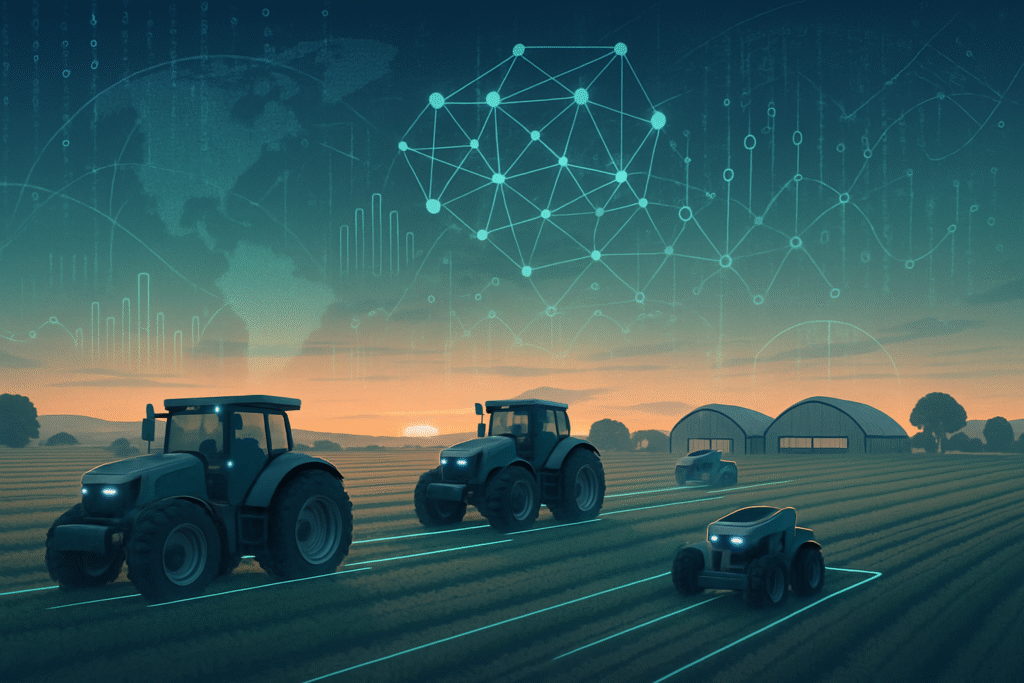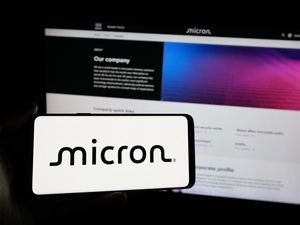
October 20, 2025 – Agtonomy, a pioneer in agricultural automation, has announced a significant global expansion of its AI-powered autonomous fleets, marking a pivotal moment for the future of farming. This strategic move, which includes new deployments across the southeastern United States and its first international commercial operation in Australia, underscores a growing industry reliance on intelligent automation to combat persistent challenges such as labor shortages, escalating operational costs, and the urgent demand for sustainable practices. By transforming traditional agricultural machinery into smart, self-driving units, Agtonomy is not just expanding its footprint; it's redefining the operational paradigm for specialty crop producers and land managers worldwide.
The immediate significance of Agtonomy's expansion lies in its potential to democratize advanced agricultural technology. Through strategic partnerships with leading original equipment manufacturers (OEMs) like Bobcat (NYSE: LBRD) and Kubota (TYO: 6326), Agtonomy is embedding its cutting-edge software and services platform into familiar machinery, making sophisticated automation accessible to a broader base of farmers through established dealer networks. This approach addresses the critical need for increased efficiency, reduced labor dependency, and enhanced precision in high-value crop cultivation, promising a future where a single operator can manage multiple tasks with unprecedented accuracy and impact.
The Physical AI Revolutionizing Farm Operations
Agtonomy's technological prowess centers around its third-generation platform, released in April 2025, which introduces a concept dubbed "Physical AI." This advanced system enables infrastructure-free autonomy, a significant departure from previous approaches that often required extensive pre-mapping or reliance on local base stations. The platform integrates embedded cellular and Starlink connectivity with sophisticated vision-based navigation, allowing for immediate deployment in diverse and challenging agricultural environments. This means tractors can navigate precisely through narrow rows of high-value crops like fruit trees and vineyards without the need for pre-existing digital maps, adapting to real-time conditions with remarkable agility.
At the core of Agtonomy's innovation is its "TrunkVision" technology, which leverages computer vision to ensure safe and accurate operation, even in areas with limited GPS visibility—a common hurdle for traditional autonomous systems. This vision-first approach allows for centimeter-level precision, minimizing crop damage and maximizing efficiency in tasks such as mowing, spraying, and weeding. Furthermore, the multi-fleet management capability allows a single operator to remotely oversee more than ten autonomous tractors simultaneously, with the system continuously learning and improving its performance from real-world data. This intelligent feedback loop fundamentally differs from rigid, rule-based automation, offering a dynamic and evolving solution that adapts to the unique demands of each farm. Initial reactions from the agricultural research community and early adopters have highlighted the platform's robustness and ease of integration, praising its practical application in solving long-standing operational bottlenecks.
The Agtonomy platform also includes a comprehensive "Smart Farm Task Ecosystem." This ecosystem digitally connects self-driving tractors with various implements through innovations like the Smart Take-Off (STO) for efficient power and data transfer, and the Smart Toolbar, which intelligently adjusts tools based on plant spacing and terrain. Smart Implement Sensors (SIS) and Smart Sprayers further enhance precision, allowing for optimized application rates of inputs based on real-time data such as canopy density or weed pressure. This integrated approach not only boosts efficiency but also significantly contributes to sustainable farming by reducing chemical usage and resource consumption.
Reshaping the Agricultural Automation Landscape
Agtonomy's global expansion and technological advancements are poised to significantly impact the competitive landscape for AI companies, tech giants, and startups in the agricultural sector. Companies like Kubota and Bobcat, by partnering with Agtonomy, stand to benefit immensely by integrating cutting-edge AI into their product lines, offering their customers advanced solutions without the need for extensive in-house AI development. This strategy positions them as leaders in the rapidly evolving smart agriculture market, potentially disrupting the dominance of traditional agricultural machinery manufacturers who have been slower to adopt comprehensive autonomous solutions.
The competitive implications extend to other major AI labs and tech companies eyeing the agricultural space. Agtonomy's focus on "Physical AI" and infrastructure-free autonomy sets a high bar, challenging competitors to develop equally robust and adaptable systems. Startups focusing on niche agricultural AI solutions might find opportunities for integration with Agtonomy's platform, while larger tech giants like John Deere (NYSE: DE) and CNH Industrial (NYSE: CNHI), who have their own autonomous initiatives, will face increased pressure to accelerate their innovation cycles. Agtonomy's mobile-first control and versatile application across compact and mid-size tractors give it a strategic advantage in market positioning, making advanced automation accessible and user-friendly for a broad segment of farmers. This development could catalyze a wave of consolidation or strategic alliances as companies vie for market share in the burgeoning autonomous agriculture sector.
The potential disruption to existing products and services is substantial. Manual labor-intensive tasks will increasingly be automated, leading to a shift in workforce roles and a demand for new skill sets related to operating and managing autonomous fleets. Traditional agricultural software providers might need to adapt their offerings to integrate with or compete against Agtonomy's comprehensive platform. Furthermore, the precision agriculture market, already experiencing rapid growth, will see an acceleration in demand for AI-driven solutions that offer tangible benefits in terms of yield optimization and resource efficiency. Agtonomy's strategy of partnering with established OEMs ensures a faster route to market and wider adoption, giving it a significant edge in establishing a dominant market position.
Broader Significance and Ethical Considerations
Agtonomy's global expansion fits squarely into the broader AI landscape trend of moving AI from theoretical models to practical, real-world applications, especially in sectors traditionally lagging in technological adoption. This development signifies a major step towards intelligent automation becoming an indispensable part of critical global industries. It underscores the increasing sophistication of "edge AI"—processing data directly on devices rather than relying solely on cloud infrastructure—which is crucial for real-time decision-making in dynamic environments like farms. The impact on food security, rural economies, and environmental sustainability cannot be overstated, as autonomous fleets promise to enhance productivity, reduce waste, and mitigate the ecological footprint of agriculture.
However, with great power comes potential concerns. The increased reliance on automation raises questions about data privacy and security, particularly concerning sensitive farm data. The digital divide could also widen if smaller farms or those in less developed regions struggle to access or afford such advanced technologies, potentially leading to further consolidation in the agricultural industry. Furthermore, the ethical implications of AI in labor markets, specifically the displacement of human workers, will require careful consideration and policy frameworks to ensure a just transition. Comparisons to previous AI milestones, such as the advent of precision GPS farming or early robotic milking systems, reveal a clear trajectory towards increasingly autonomous and intelligent agricultural systems. Agtonomy's vision-based, infrastructure-free approach represents a significant leap forward, making high-level autonomy more adaptable and scalable than ever before.
This development aligns with global efforts to achieve sustainable development goals, particularly those related to food production and responsible consumption. By optimizing resource use and minimizing environmental impact, Agtonomy's technology contributes to a more resilient and eco-friendly agricultural system. The ability to manage multiple machines with a single operator also addresses the demographic challenge of an aging farming population and the decreasing availability of agricultural labor in many parts of the world.
The Horizon: Future Developments and Challenges
Looking ahead, Agtonomy's expansion is just the beginning. Expected near-term developments include the refinement of its "Physical AI" to handle an even wider array of crops and environmental conditions, potentially incorporating more advanced sensor fusion techniques beyond just vision. Long-term, we can anticipate the integration of Agtonomy's platform with other smart farm technologies, such as drone-based analytics, advanced weather forecasting AI, and sophisticated yield prediction models, creating a truly holistic and interconnected autonomous farm ecosystem. Potential applications on the horizon extend beyond traditional agriculture to include forestry, landscaping, and even municipal grounds management, wherever precision and efficiency are paramount for industrial equipment.
However, significant challenges remain. Regulatory frameworks for autonomous agricultural vehicles are still evolving and will need to catch up with the pace of technological advancement, especially across different international jurisdictions. The cost of adoption, while mitigated by OEM partnerships, could still be a barrier for some farmers, necessitating innovative financing models or government subsidies. Furthermore, ensuring the cybersecurity of these interconnected autonomous fleets will be critical to prevent malicious attacks or data breaches that could cripple farm operations. Experts predict that the next phase will involve a greater emphasis on human-AI collaboration, where farmers utilize AI as an intelligent assistant rather than a complete replacement, focusing on optimizing workflows and leveraging human expertise for complex decision-making. Continuous training and support for farmers transitioning to these new technologies will also be crucial for successful adoption and maximizing benefits.
A New Chapter for Agricultural AI
In summary, Agtonomy's global expansion with its AI-powered autonomous fleets marks a profound moment in the history of agricultural technology. The company's innovative "Physical AI" and vision-based navigation offer a practical, scalable solution to some of farming's most pressing challenges, promising increased efficiency, reduced costs, and enhanced sustainability. By democratizing access to advanced automation through strategic OEM partnerships, Agtonomy is not just selling technology; it's fostering a new paradigm for how food is grown and managed.
The significance of this development in AI history lies in its successful translation of complex AI research into tangible, field-ready applications that deliver immediate economic and environmental benefits. It serves as a testament to the power of specialized AI to transform traditional industries. In the coming weeks and months, the agricultural world will be watching closely for the initial performance metrics from the new deployments, further partnerships, and how Agtonomy continues to evolve its platform to meet the dynamic needs of a global farming community. The journey towards fully autonomous, intelligent agriculture has truly gained momentum, with Agtonomy leading the charge into a more productive and sustainable future.
This content is intended for informational purposes only and represents analysis of current AI developments.
TokenRing AI delivers enterprise-grade solutions for multi-agent AI workflow orchestration, AI-powered development tools, and seamless remote collaboration platforms.
For more information, visit https://www.tokenring.ai/.





